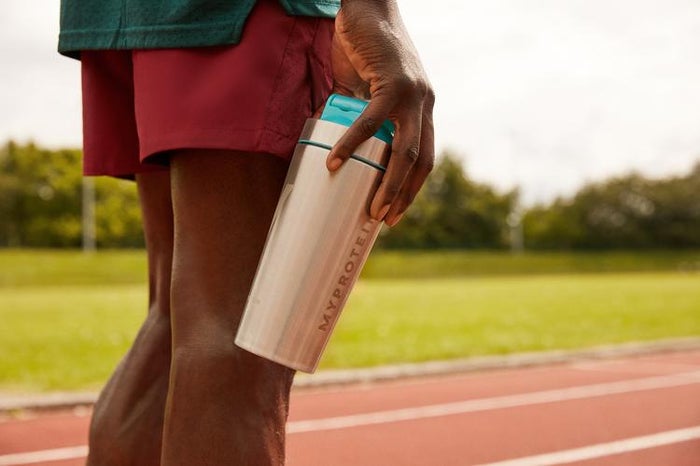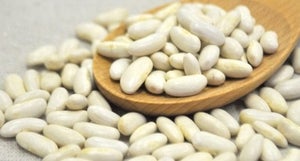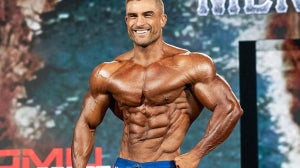
If you look around any gym these days, there’ll be no shortage of fitness enthusiasts chugging down a protein shake before or after their workout.
So, do you need protein shakes to achieve your training and nutrition goals? A protein shake is arguably one of the best supplements you can buy. It’s extremely convenient and practical to use, and there’s plenty of science that supports how important protein is.
However, most people are still unsure of when the best time is to have their protein shake — is it before or after their workout?
This article will explain how protein shakes work and what the best time is to take them for your training goals.
Should you drink protein before or after a workout?
Protein is essential to help with muscle growth and recovery after a tough workout, so it makes sense that you’ll want to plan your protein around your training, but when’s the best time to have protein and how much do you need?
Before considering the best time for you to take your protein shake, whether that’s before or after training, make sure you get your priorities in order. You need to think of the big picture first and work out how much protein you need each day. Your protein shake can be a part of this. If you’re short of your daily protein intake, then the timing of when you’re consuming your shake becomes largely irrelevant.
A range of 1.8 to 2.2 g of protein per kg of body weight will be good for most people who have body composition goals. The consideration you need to make here is whether you need to be in a calorie surplus to build muscle or a calorie deficit to lose fat.3
Pre-workout shakes:
When you exercise, you place your body under controlled stress. When doing resistance work, the goal is often to grow lean muscle or to lose body fat whilst retaining the muscle you already have. It can vary from person to person how far they wish to push their body — from a lean, toned look, to a ripped, bodybuilder physique.
The one common aim will be to keep muscle mass. For this, you need protein. This is because muscles are damaged when you exercise. Although protein might not prevent the soreness that comes with training, it can provide the building blocks — amino acids — to help you to recover.5
Ideally, you need protein to be in your system a few hours before you train. The reason for this is to have a circulating pool of amino acids, which can help encourage something known as ‘muscle protein synthesis’ (MPS). This is a signal telling the body to grow muscle and recover. Depending on the type you eat, the digestion rates of protein will vary. A large steak could take a few hours to break down, whereas amino acids from a whey protein shake could already be available within about an hour. 4
How do you know if a pre-workout protein shake is for you?
If you don’t enjoy training on a stomach full of food, but don’t want to train fasted, then consuming a shake before your workout could be a good idea. Pre-workout shakes are a convenient way to absorb protein, roughly an hour before training, without having to worry about feeling full and bloated when exercising.
Another good reason to reach for a pre-workout protein shake could be that you train early in the morning, or rush off during your lunch break and simply don’t have time to eat before training.
The main reason to consume a pre-workout shake are that it’s convenient for your lifestyle, as you’re looking to add protein to your daily intake and for help towards reaching your health and fitness goals.
Once you have consumed a pre-workout protein shake, the amino acids present from the protein will be available in your bloodstream during- and straight after your workout to help your body to build- and repair lean muscle tissue. 7

Post-workout shakes:
There’s a popular term in bodybuilding and fitness circles called the “anabolic window”. Anabolic means ‘building up’ (muscle in this case), so this is a theoretical 30-minute window after doing weight training when you could put on most muscle if you get your protein in. 8
Now, if this were to be true, then most of us would bring our containers full of chicken to the gym, so why not use a protein shake? The good news is that the anabolic window doesn’t exist, but that doesn’t stop a post-workout protein shake from being a useful part of your diet plan. 8
A tough training session is very stressful on the body and what your body needs after this is some high-quality protein to help rebuild and repair the damage that was caused. One of the benefits of using a post-workout shake is that you are using a high-quality protein source to fuel the anabolic process in your body. Your body needs both decent quantity and quality to perform at its best, and a shake ticks both boxes.
This is because, depending on what kind of shake you get, the protein could be very readily available and quickly used to build muscle rather than waiting for a solid meal to digest.
A post-workout protein shake could have a few major benefits.
Depending on the source, they often have a high bio-availability. This means that the protein is used very well in the body compared to that of a different source, such as solid food.
If you use a large amount of water or milk with your post-workout shake, then you’ll also be replenishing water levels in the body, which is important for optimal muscle growth and recovery.
There’s the added bonus of convenience too. Often, after training, you rush into meetings, or have to travel home from work. If you don’t feel like bringing in containers of food to the gym, then a post-workout protein shake could be a great, convenient option.
Which protein shake is best for your workout?
Whether it’s a shake for before- or after your workout, whey protein comes out on top. Whey protein is the most bio-available protein on the market — it beats both solid foods, and other protein supplements. When a protein has a high bio-availability, this means it is absorbed and used very efficiently in the body. Whey protein has a bio-availability somewhere between 90% to 100%, so it comes out on top when compared to other convenient protein sources.4
There’s also a timing benefit to using whey protein. Protein from whey is broken down very quickly compared to other proteins and its amino acids are readily available within roughly an hour. Alternative proteins, like casein, break down at a much slower rate, and have an almost drip-feed effect. So, if you don’t have time to eat a solid meal around your workout window and are in need of some fast-acting, high-quality protein, you won’t go wrong with whey. 4 Also, if you mix your whey protein shake with milk, it behaves more like casein and slows down the digestion rate.

What is more important —a pre- or post-workout protein shake?
The answer is, it really depends on you. It comes down to personal preference and whether or not you enjoy incorporating a protein shake into your diet.
There’s, without a doubt, the benefit of adding some high-quality whey protein into the diet in terms of its bio-availability, as it can be quickly digested and used for muscle building. A study by Schoenfeld actually investigated what’s better for muscle adaptations — a pre- or post-workout shake. The results didn’t show favour one way or the other when total daily protein and the quality was matched. Pre did not outperform post or vice versa.7
It really comes down to a preference- and convenience factor. You could go for a pre-workout shake, a post-workout shake or both. There is one rule however, make sure you get good quality protein in the time before and after your training. How long before- or after your training should you consume your pre- or post-workout protein shake? Well, that depends on what type of protein you’re using. General guidelines are anywhere from 1 to 3 hours before training and 1 to 2 hours after training.3
Take home message
Before thinking about whether it’s better for you to have a pre- or post-workout protein shake, make sure you get enough total protein into your diet each day. Whether your goal is fat loss or muscle gain, this must come first. Around 2g of protein per kg of bodyweight each day will be good for most.
Whey is considered the best option for a pre- or post-workout shake. A pre-workout shake can be taken one or two hours before training, depending on your personal digestion rates. A post-workout shake can be taken at any convenient time after training, preferably within one hour.
What’s best for you? Well, you can think about what suits your lifestyle and preferences. If you need energy before your workout, then start with a shake and if you’re looking for an option to help with recovery, then afterwards will work well. You can have a pre- or post-workout shake — or even both!
FAQ
Should I drink a protein shake before or after a workout?
The most effective time to use a protein shake is after a workout when your muscles are rebuilding. However, your total protein intake for the day is also important.Should I have a protein shake before or after a workout for muscle gain?
When you want to gain muscle, you need to have available protein for your muscles to build - making it best to have your protein shake after your workout.Should I have a protein shake before or after a workout for weight gain?
If you are trying to gain weight, you need an excess of calories for the day, so you can take your protein shake at any time. However, taking it after a workout also helps repair and preserve muscle mass.What's the best protein shake before a workout?
The best protein shake to take before a workout would be one that digests slowly — like a casein protein shake.What's the best protein shake after a workout?
Any type of protein shake is fine after a workout, but whey-based shakes are absorbed quickly for maximising benefit to your muscles.Our articles should be used for informational and educational purposes only and are not intended to be taken as medical advice. If you're concerned, consult a health professional before taking dietary supplements or introducing any major changes to your diet.
- Boirie, Y., Dangin, M., Gachon, P., Vasson, M.-P., Maubois, J.-L., & Beaufrère, B. (1997). Slow and fast dietary proteins differently modulate postprandial protein accretion. Proceedings of the National Academy of Sciences of the United States of America, 94(26), 14930–14935.
- Cintineo, H. P., Arent, M. A., Antonio, J., & Arent, S. M. (2018). Effects of Protein Supplementation on Performance and Recovery in Resistance and Endurance Training. Frontiers in Nutrition, 5. https://doi.org/10.3389/fnut.2018.00083
- Helms, E. R., Aragon, A. A., & Fitschen, P. J. (2014). Evidence-based recommendations for natural bodybuilding contest preparation: nutrition and supplementation. Journal of the International Society of Sports Nutrition, 11, 20. https://doi.org/10.1186/1550-2783-11-20
- Hoffman, J. R., & Falvo, M. J. (2004). Protein – Which is Best? Journal of Sports Science & Medicine, 3(3), 118–130.
- Kim, J., Lee, C., & Lee, J. (2017). Effect of timing of whey protein supplement on muscle damage markers after eccentric exercise. Journal of Exercise Rehabilitation, 13(4), 436–440. https://doi.org/10.12965/jer.1735034.517
- Monteyne, A., Martin, A., Jackson, L., Corrigan, N., Stringer, E., Newey, J., … James, L. J. (2018). Whey protein consumption after resistance exercise reduces energy intake at a post-exercise meal. European Journal of Nutrition, 57(2), 585–592. https://doi.org/10.1007/s00394-016-1344-4
- Schoenfeld, B. J., Aragon, A., Wilborn, C., Urbina, S. L., Hayward, S. E., & Krieger, J. (2017). Pre- versus post-exercise protein intake has similar effects on muscular adaptations. PeerJ, 5. https://doi.org/10.7717/peerj.2825
- Nutrient timing revisited: is there a post-exercise anabolic window? – PubMed – NCBI. (n.d.). Retrieved May 27, 2019, from https://www.ncbi.nlm.nih.gov/pubmed/23360586

Coach Grant is a sports nutritionist and certified strength coach. He has multiple postgraduate diplomas in nutrition and strength coaching as well as a Master’s degree in Sports and Exercise Nutrition, with a specific focus on protein.
Grant has worked in the fitness industry for well over a decade and has helped coach professional athletes and sports teams, as well as the average gym-goer looking to get in the best shape possible. He now spends most of his working time teaching fitness professionals and coaching people remotely.
He’s a big believer in practising what he preaches and has been involved in resistance training and martial arts for over 20 years. In his spare time, Grant enjoys being with his wife and daughter as well as the family dogs and catching up on the latest Netflix series.
Find out more about Grant’s experience here and about his personal training here.








